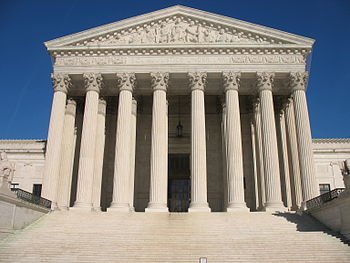
07 Jun “Defalcation” Explained. Sort Of.
Early last month the Supreme Court held that non-dischargeability for defalcation in breach of a fiduciary duty (see 11 U.S.C. 523(a)(4)) requires a showing of subjective intent (i.e., “scienter“) to misuse funds.

English: The Supreme Court of the United States. Washington, D.C. Français : La Cour suprême des États-Unis. Washington D.C., États-Unis. Norsk (bokmål)â¬: Høyesterett i USA. Washington, D.C. (Photo credit: Wikipedia)
BULLOCK v. BANKCHAMPAIGN, N. A. resolves a split in the Circuit courts over whether scienter was required to establish non-dischargeability under this section. Compare In re Sherman, 658 F. 3d 1009, 1017 (CA9 2011) (“defalcation” includes “even innocent acts of failure to fully account for money received in trust” (internal quotation marks and brackets omitted)), with In re Uwimana, 274 F. 3d 806, 811 (CA42001) (defalcation occurs when “negligence or even an innocent mistake . . . results in misappropriation”), with 670 F. 3d, at 1166 (“defalcation requires . . . conduct [that] can be characterized as objectively reckless”), and with In re Baylis, 313 F. 3d 9, 20 (CA1 2002) (“defalcation requires something close to a showing of extreme recklessness”).
The Supremes found that to establish 523(a)(4) non-dischargeability, scienter is required. As seems to be frequently the case with this Court, the Ninth Circuit was not on the prevailing end of the circuit split.
A copy of the slip opinion is here.
Related articles
- When Can a Fiduciary Duty Be Discharged In a Bankruptcy Proceeding? (lawprofessors.typepad.com)
- Supreme Court clarifies when debt can be discharged in bankruptcy case (jurist.org)
- Opinion analysis: Justices protect discharge for “innocent” trustee (scotusblog.com)
- Potential Clarification of Fiduciary Duties (lawprofessors.typepad.com)




No Comments